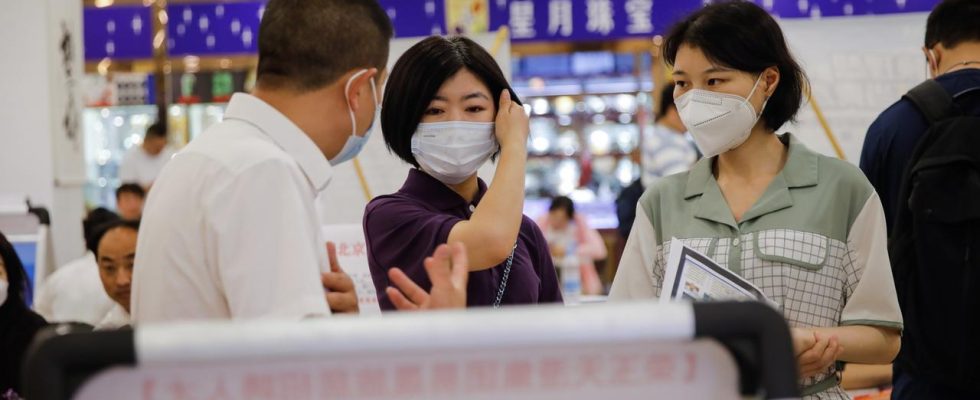China’s economic recovery continues to lose momentum. Youth unemployment reached a record high of over 20 percent in April. The consequences of the corona pandemic are still being felt.
Well at least, some might say: an increase of 0.2 percent in consumer prices in May. Because inflation is not too high in China, but too low. The mini-plus suggests at least slightly better demand for goods and services than in April, when the value was at its lowest level in two years.
Otherwise, current economic data paints a rather bleak picture, says Wang Dan, chief economist at Hang Seng Bank in Shanghai: “This is not a stable economic recovery. The real estate market is particularly problematic. People simply don’t have the money to buy an apartment. And overall consumption is also regularly weaker than expected.”
Consequences of the pandemic still noticeable
At the end of last year, the government in Beijing abandoned its zero-Covid policy overnight. Previously, lockdowns and other bans meant that small businesses such as restaurants or shops in particular had to close and lay off employees. This affects the second largest economy and its inhabitants to this day.
Mattie Bekink from the Economist Intelligence Corporate Network told the TV channel CNBC that those who have no money and do not believe that the situation is improving are not contributing to any upturn either: “Income expectations have fallen massively. Due to the layoffs during the Pandemic, due to dwindling trust and changing consumer behavior.” And then there is still high youth unemployment and a weakening global economy. “It’s very difficult for people to be optimistic,” says Bekink. According to data from the statistics office, the unemployment rate for 16 to 24 year olds was 20.4 percent in April.
Vouchers for private consumption
Private consumption is particularly important in China. There is no anger about soaring inflation rates here. Also because the prices – unlike last year in Europe – are not driven by rising energy costs. At the beginning of the year, the government issued vouchers to people with which they could buy household appliances or electric cars.
The salvation in the first quarter – when the Chinese economy grew by 4.5 percent – was more the export. Exports had recorded a strong increase. According to the data this week, that is history again. Exports collapsed in May. Now the statistics authority has reported that producer prices, i.e. the prices at which manufacturers sell their goods to traders, have fallen further – by 4.6 percent in the past month.
No further economic stimulus?
At the moment, state-owned companies are far more successful than private ones. Economist Wang Dan says: “It’s a worrying signal. Because we know that these companies are less efficient and don’t create jobs. Since 2010, all jobs in China’s big cities have been created by private companies. So this private-sector market has to play a much bigger role play for a rest.”
So far, the communist state and party leadership has not sent any signals that it is planning further economic stimulus measures. Not least because many still believe that the goal of increasing China’s gross domestic product by 5 percent for the year as a whole is still achievable. Meanwhile, the Chinese central bank could possibly cut interest rates on certain loans as early as next week, observers say.

